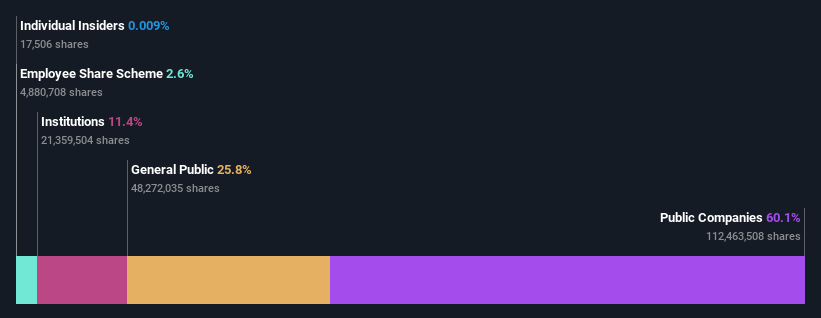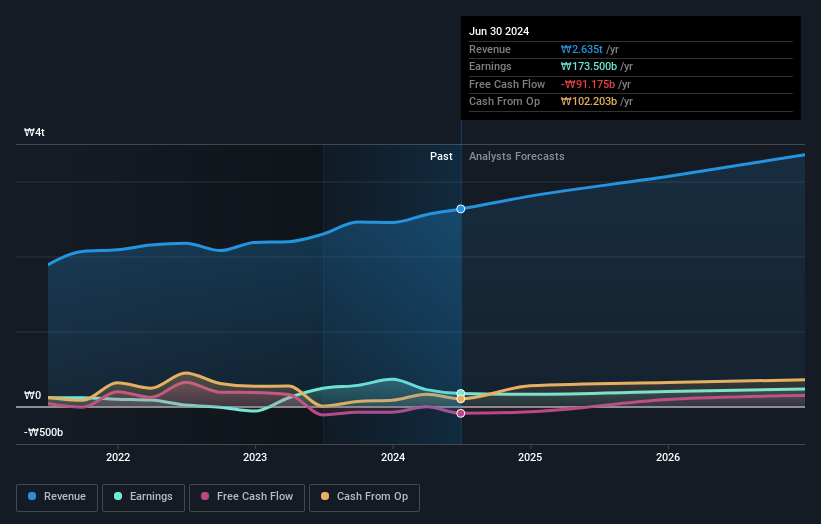- South Korea
- /
- Aerospace & Defense
- /
- KOSE:A272210
Public companies are Hanwha Systems Co., Ltd.'s (KRX:272210) biggest owners and were hit after market cap dropped ₩266b

Key Insights
- The considerable ownership by public companies in Hanwha Systems indicates that they collectively have a greater say in management and business strategy
- The top 2 shareholders own 60% of the company
- 11% of Hanwha Systems is held by Institutions
If you want to know who really controls Hanwha Systems Co., Ltd. (KRX:272210), then you'll have to look at the makeup of its share registry. With 60% stake, public companies possess the maximum shares in the company. In other words, the group stands to gain the most (or lose the most) from their investment into the company.
As a result, public companies as a group endured the highest losses last week after market cap fell by ₩266b.
In the chart below, we zoom in on the different ownership groups of Hanwha Systems.
See our latest analysis for Hanwha Systems

What Does The Institutional Ownership Tell Us About Hanwha Systems?
Many institutions measure their performance against an index that approximates the local market. So they usually pay more attention to companies that are included in major indices.
As you can see, institutional investors have a fair amount of stake in Hanwha Systems. This suggests some credibility amongst professional investors. But we can't rely on that fact alone since institutions make bad investments sometimes, just like everyone does. When multiple institutions own a stock, there's always a risk that they are in a 'crowded trade'. When such a trade goes wrong, multiple parties may compete to sell stock fast. This risk is higher in a company without a history of growth. You can see Hanwha Systems' historic earnings and revenue below, but keep in mind there's always more to the story.

Hedge funds don't have many shares in Hanwha Systems. Hanwha Aerospace Co., Ltd. is currently the company's largest shareholder with 47% of shares outstanding. In comparison, the second and third largest shareholders hold about 13% and 7.2% of the stock.
A more detailed study of the shareholder registry showed us that 2 of the top shareholders have a considerable amount of ownership in the company, via their 60% stake.
While it makes sense to study institutional ownership data for a company, it also makes sense to study analyst sentiments to know which way the wind is blowing. There are a reasonable number of analysts covering the stock, so it might be useful to find out their aggregate view on the future.
Insider Ownership Of Hanwha Systems
While the precise definition of an insider can be subjective, almost everyone considers board members to be insiders. Company management run the business, but the CEO will answer to the board, even if he or she is a member of it.
Insider ownership is positive when it signals leadership are thinking like the true owners of the company. However, high insider ownership can also give immense power to a small group within the company. This can be negative in some circumstances.
Our information suggests that Hanwha Systems Co., Ltd. insiders own under 1% of the company. Keep in mind that it's a big company, and the insiders own ₩301m worth of shares. The absolute value might be more important than the proportional share. It is good to see board members owning shares, but it might be worth checking if those insiders have been buying.
General Public Ownership
The general public, who are usually individual investors, hold a 26% stake in Hanwha Systems. While this size of ownership may not be enough to sway a policy decision in their favour, they can still make a collective impact on company policies.
Public Company Ownership
Public companies currently own 60% of Hanwha Systems stock. It's hard to say for sure but this suggests they have entwined business interests. This might be a strategic stake, so it's worth watching this space for changes in ownership.
Next Steps:
It's always worth thinking about the different groups who own shares in a company. But to understand Hanwha Systems better, we need to consider many other factors. Consider for instance, the ever-present spectre of investment risk. We've identified 3 warning signs with Hanwha Systems , and understanding them should be part of your investment process.
Ultimately the future is most important. You can access this free report on analyst forecasts for the company.
NB: Figures in this article are calculated using data from the last twelve months, which refer to the 12-month period ending on the last date of the month the financial statement is dated. This may not be consistent with full year annual report figures.
Valuation is complex, but we're here to simplify it.
Discover if Hanwha Systems might be undervalued or overvalued with our detailed analysis, featuring fair value estimates, potential risks, dividends, insider trades, and its financial condition.
Access Free AnalysisHave feedback on this article? Concerned about the content? Get in touch with us directly. Alternatively, email editorial-team (at) simplywallst.com.
This article by Simply Wall St is general in nature. We provide commentary based on historical data and analyst forecasts only using an unbiased methodology and our articles are not intended to be financial advice. It does not constitute a recommendation to buy or sell any stock, and does not take account of your objectives, or your financial situation. We aim to bring you long-term focused analysis driven by fundamental data. Note that our analysis may not factor in the latest price-sensitive company announcements or qualitative material. Simply Wall St has no position in any stocks mentioned.
About KOSE:A272210
Hanwha Systems
Hanwha Systems Co., Ltd. manufacture and sell various military equipments in South Korea and internationally.
Flawless balance sheet with reasonable growth potential.


